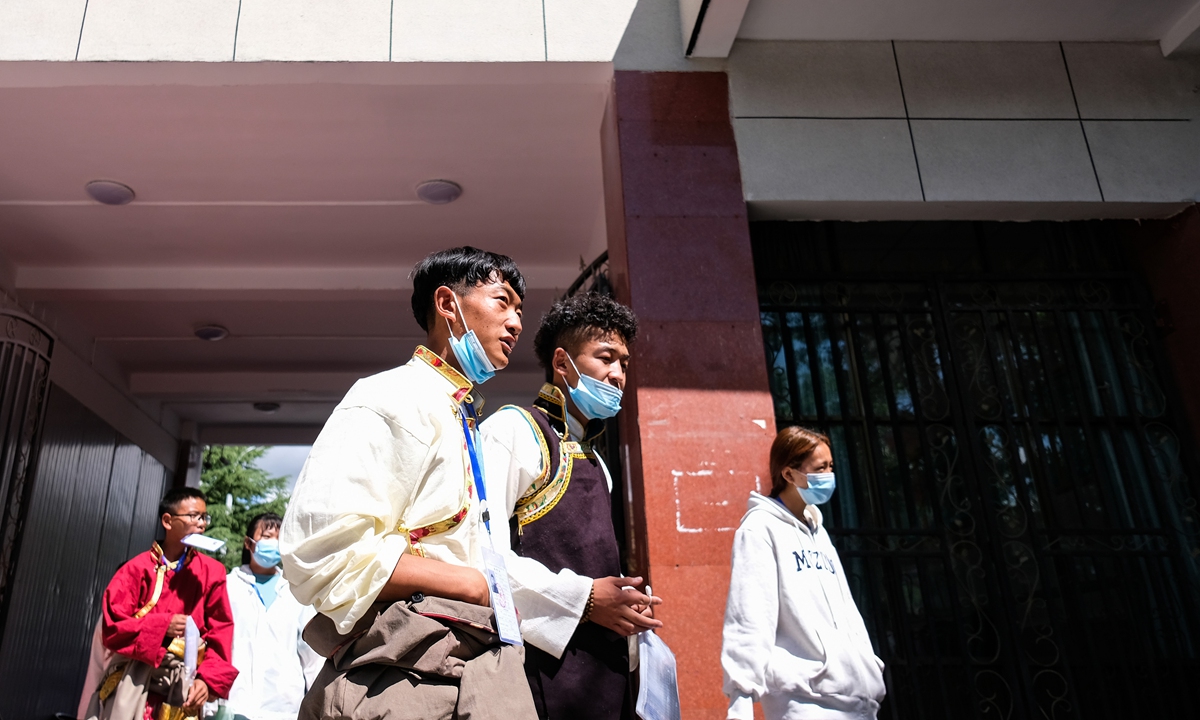Anhui Province to cancel bonus points for ethnic minorities in college entrance exams

Students in Tibetan traditional costume walk out of the test center for the national college entrance examination or gaokao in Lhasa Middle School in Lhasa, Southwest China's Tibet Autonomous Region. Photo: cnsphoto
The education authority of Anhui Province in E. China announced it would cancel the extra points for ethnic minorities in college entrance examinations, known as gaokao, from 2022. Experts and netizens welcomed the move, saying it will boost educational equality and national unity.
Under the guidelines of the Ministry of Education, and five other ministries, Anhui's provincial education authority said on Friday that it had decided to cancel extra points in the gaokao for ethnic minority examinees in areas where ethnic minorities live in compact communities, adding that overseas Chinese and their dependents, Hong Kong, Macao people and their dependants will also no longer enjoy the special policy.
The authority explained that in 2020 and 2021, gaokao candidates who meet the criteria of the policy are still eligible for an additional five points, which is only applicable to the enrollment of colleges and universities in Anhui Province.
Observers said that over 40 years after the reform and opening-up in 1978, many ethnic minority areas have shaken off their economic and educational underdevelopment, so the adjustment of the policy is necessary.
Chu Zhaohui, a research fellow at the National Institute of Education Sciences, told the Global Times on Monday that some people in ethnic minority communities speak their own language, so it is necessary for them to have bonus points. However, in Anhui and some other provinces in East China, ethnic minorities have mixed with the Han people, and the social, economic and cultural conditions are basically the same. As a result, extra points for ethnic minorities creates a kind of injustice.
Anhui has no autonomous counties for ethnic minorities. Therefore, Anhui's decision is very likely to cancel the policy in the whole province, which is conducive to promoting gaokao equality, Chu said.
There are other regions in China that have applied new regulations regarding extra points for ethnic minorities in college entrance examinations. In 2016, Shandong Province in East China announced it would cancel extra points for ethnic minorities in mountainous areas and ethnic minority areas in 2017. The number of ethnic minority students who enjoyed the gaokao bonus points in Beijing has plummeted from over 6,000 to only four students in 2017, media reports said.
Anhui's cancelation of the bonus points became a hot topic on social media on Monday, with many internet users expressing support.
"Unfairness and inequality are the major causes of discrimination and antagonism, and Anhui's move could really help unite people from different backgrounds in the nation," an internet user said on Weibo, and the comment received a lot of likes.
"Everyone should be equal in the gaokao. I hope it (Anhui's move) will be promoted nationwide," said another.
For provincial-level regions like Anhui, in which most of the ethnic minorities and the Han people live together, and the ethnic minority areas are only scattered in the areas below the county level, cancelation of gaokao bonus points for ethnic minorities might be a feasible option, said Chu.
From 1950 to 1978, China adopted the policy of preferential admission for ethnic minority students in the gaokao, and after 1978, it mainly implemented the policy of bonus points. Most of China's border areas, mountainous areas, rural areas and areas where ethnic minorities live in compact communities still have preferential policies for ethnic minority examinees to have bonus points in the gaokao.

